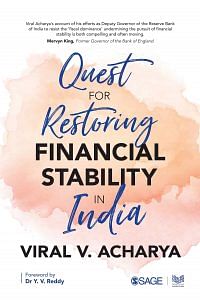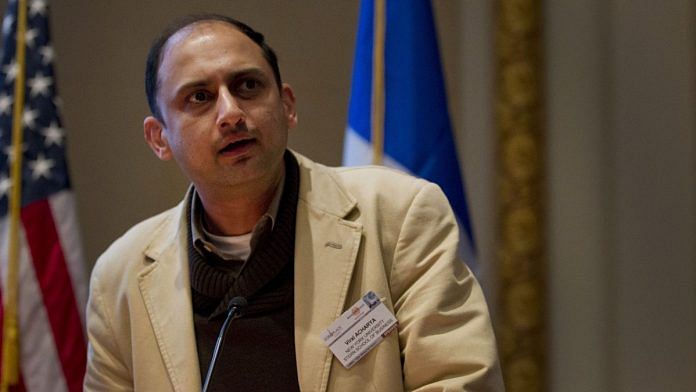Kiss of Death’: Incurring the Wrath of Markets
Far-sighted government leaders may be able to reap benefits of convincing voters about the importance of investing in macroeconomic stability; for instance, by claiming credit for the long-term nature of financial sector outcomes attained by allowing the central bank autonomy in decision-making and delivery of its core functions. When such a measured perspective of an independent central bank as a key element of durable economic prosperity is missing and/or government myopia so rife as to lead to regular inroads into central banking apparatus and decisions, unfortunate accidents can arise. Macroeconomic management can become a tug of war between securing stability and inflicting misdirection; daily operational decisions lead to power struggles; and, as the central bank is forced to bend over backwards to retain credibility in the face of imminent pressures that would erode its independence, counter efforts to reduce its independence escalate.
As this dynamic plays out, markets watch keenly, and if uncertainty grows and confidence in central bank independence and credibility erode, then markets rap bond yields and exchange rate on the knuckles!
Let me elaborate.
Modern economies are, by and large, not autarkies; they rely on capital markets to finance their investments. This is especially true of governments as reflected in the relatively large size of sovereign (and quasi-sovereign) debt markets, denominated in domestic currency as well as foreign currency. As long-term risks such as inflation or financial instability rise, markets reprice sovereign debt and may potentially shun its financing altogether. This could have immediate spillovers to other markets such as for foreign exchange and foreign investments, potentially putting at risk also the external sector stability of the economy.
Therefore, the presence of this third player—the market—in the back and forth between a government and the central bank (more generally, regulatory institutions) is an important feedback mechanism. The market can discipline the government not to erode central bank independence, and it can also make the government pay for its transgressions. interestingly, the market also forces central banks to remain accountable and independent when it is under government pressure.
Besides the market revolt and strictures during the Argentine episode of 2010 that I recounted in my introductory remarks, it is to be noted that both of this year’s EM sovereign bonds and currency meltdowns got catalyzed through a perception of government influence on central bank’s monetary policy, including through sporadic communication by government with public on its desire to control the central bank’s decision-making. In one case, a rate cut in the wake of rising inflation and mounting fiscal deficit did the damage; and in the other, it was a public pronouncement by the premier of the state about the ‘evils’ of interest rate hikes even when inflation was in double digit terrain.
Indeed, the market censure need not be limited to EMs. The public expression of government’s bewilderment and disappointment at monetary tightening in the world’s largest safe-haven economy, again at a time of rising inflation and fiscal deficit, has raised in minds of investors scenarios under which its reserve currency status cannot anymore be taken for granted (The Economist 2018).
Also read: Any govt unlikely to pursue meaningful privatisation of banks — ex-RBI governor Urjit Patel
Barry Eichengreen, Professor of economics and Political science at the University of California, Berkeley, covers superbly, in his recent piece (2018), this critical feedback role of the market:
There are good reasons why countries … delegate monetary policy decisions to technocrats appointed for their expertise. They can take the long view. They can resist the temptation to manipulate monetary conditions for short-term gain. Privileging long-term stability, as history has shown, is positive for economic performance. And it is on this performance that elected leaders, rightly or wrongly, are judged.
Thoughtful politicians understand this. Hence their support for central bank independence and their respect for the convention that they should refrain from seeking to influence central bank decisions. Unfortunately, not all politicians are thoughtful. Not all have the patience to wait for long-term gains. Not all are pleased when appointees refuse to bow to their wishes. And not all are respectful of inherited institutions and conventions, be they central bank independence or, more broadly, the division of powers.
The question is whether they pay attention to markets.
What Barry Eichengreen is perceptively observing is that if a government were to pay attention to markets, it would realize that central bank independence is in fact its strength and the central bank a sort of a true friend, someone who will tell the government unpleasant but brutally honest truths and correct to the extent it can any adverse long-term consequences of government policies.
Let me now turn to how all this relates to the RBI.
The Late Deena Khatkhate provides a masterful and scholarly assessment in Reserve Bank of India: A Study in the Separation and Attrition of Powers (2005). Some of the discussion below draws heavily from his assessment and is updated for developments since then. Other excellent discussions of the central bank’s autonomy and independence in the Indian context are contained in lectures by the RBI’s former Governors, Dr C. Rangarajan (1993) and Dr Y. V. reddy (2001; 2007). As we will see below, other Governors and deputy Governors have also carried this abiding theme through their tenures. For some of them, even when the RBI’s independence has been unclear de jure, governments have in the end have had the wisdom to support it de facto; for others, however, the RBI’s independence has remained a work in progress, an enduring challenge that the nation has been grappling with on an ongoing basis.
Also read: RBI Governor Shaktikanta Das is facing an increasingly tough balancing act
Ongoing Challenges in Maintaining Independence of the RBI
Few important pockets of persistent weakness, however, remain in maintaining independence of the RBI.
1. Regulation of PSBs: One important limitation is that the RBI is statutorily limited in undertaking the full scope of actions against PSBs—such as asset divestiture, replacement of management and board, license revocation and resolution actions such as mergers or sales—all of which it can and does deploy effectively in case of private banks. The significant implications of this limitation were highlighted in detail in Governor Urjit Patel’s speech (Patel 2018).
2. The RBI’s balance sheet strength: Having adequate reserves to bear any losses that arise from central bank operations and having appropriate rules to allocate profits (including rules that govern the accumulation of the capital and reserves) is considered an important part of central bank’s independence from the government (see, for example, Moser-Boehm 2006). A thorny ongoing issue on this front has been that of the rules for surplus transfer from the RBI to the government (Cogencis 2018), an issue that relates closely to the leading Argentine example in my introductory remarks. it has been covered deftly by Rakesh Mohan (2018) in the last of his three-part series of recent articles on the RBI, titled Protect the RBI’s Balance-Sheet; therein, he elucidates why a central bank needs a strong balance sheet to perform its full range of critical functions for the economy.
3.Regulatory scope: A final issue is one of regulatory scope, the most recent case in point being the recommendation to bypass the central bank’s powers over payment and settlement systems by appointing a separate payments regulator (also covered by Rakesh Mohan in his series, ibid). The RBI has published its dissent note against this recommendation on 19 October 2018.
 This excerpt from Quest for Restoring Financial Stability in India by Viral Acharya, C.V. Starr Professor of Economics in the Department of Finance at New York University Stern School of Business, has been published with permission from SAGE Publications India. (₹695.00)
This excerpt from Quest for Restoring Financial Stability in India by Viral Acharya, C.V. Starr Professor of Economics in the Department of Finance at New York University Stern School of Business, has been published with permission from SAGE Publications India. (₹695.00)




The activities of Reserve Bank Of India should be evaluated once in two years by a body of Senior Engineers, Bureaucrats, Judicial Experts, Health Specialists and Economists.The same high level body should also monitor all senior level appointments in Reserve Bank Of India. Importing experts from outside to head a statutory body of India may not be very productive. .They may be members of evaluating bodies. India is a very large complex country and theoretical economic parameters may not help India much. Further our data collection system must be given due importance and must be improved. Grass root data collection system is required to be strengthened.
Looking back, it was a mistake to get these academics from US universities to join RBI. They are ideal for their brilliant comments on TV and for occasional memorial lectures. But primarily they should be allowed to remain in their universities ( where they are of course doing a great job). By mixing theoretical economics, economic policy and India politics, they create a mess !
Anyway, if financial markets will indeed severely punish Modi for mishandling RBI, then why bother? Sickulars should be happy and wait for it to happen!! Repair work can always be done if and when Congress returns….